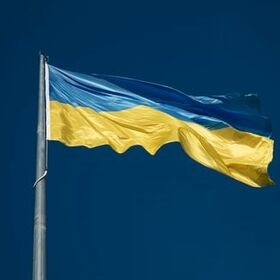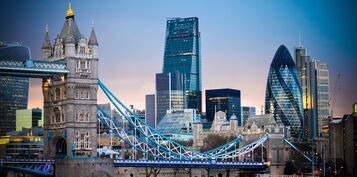Investment company managers on the war in Ukraine
“Deeply distressing” events with “far-reaching implications” for markets

Following the outbreak of war in Ukraine, the Association of Investment Companies (AIC) has asked investment company managers for their response, expectations and outlook.
This release features comments from Stephen Anness, Co-Manager of Invesco Select Trust [manager of the Global Equity Income Share Portfolio of the Trust]; Simon Edelsten, Fund Manager of Mid Wynd International Investment Trust; James Harries, Investment Manager of Securities Trust of Scotland; Ben Lofthouse, Portfolio Manager of Henderson International Income Trust; and Zehrid Osmani, Portfolio Manager of Martin Currie Global Portfolio Trust.
James Harries, Investment Manager of Securities Trust of Scotland, said: “The events unfolding in Ukraine are deeply distressing and have far-reaching implications for the world, the economy and capital markets. Geopolitical risk is ever-present and has a nasty habit of flaring up unexpectedly. In our experience, however, it is not wise to make material changes to portfolios based on such events other than to keep a keen eye out for pre-identified opportunities. We have no investments in Russia or Ukraine and only about 1.8% on an underlying revenue basis. The immediate, direct effect on our portfolio is therefore likely to be very limited.
“This does not mean our portfolio will be unaffected. We have been concerned about the valuation of equity markets within the context of a likely slowing economy as indicated by a rapidly flattening yield curve for some time (as short-term rate expectations rise but longer-term inflation expectations remain quiescent). In essence, we think current events further accentuate this trend. The rapid increase in commodity prices, especially oil, make a global recession much more likely. This will, in turn, lead to a probable amelioration in prices. While rising oil prices are inflationary short term, longer term they suck demand out of the broader economy and lead to declining consumption and economic growth. The Russian invasion makes it more probable we will have higher short-term inflation, fewer global rate rises but a steeper recession.”
Stephen Anness, Co-Manager of Invesco Select Trust [manager of the Global Equity Income Share Portfolio of the Trust], said: “Making forecasts at this stage is fraught with difficulty, however some outcomes seem certain. Energy prices will stay high for the foreseeable future, food prices may well rise as we go through the year. The squeeze on consumer disposable incomes globally will continue, especially in Europe as rising defence spending may have to be funded through higher taxes. In relative terms, the US may well do better than Europe in the medium term due to self-sufficiency in energy and lower geopolitical risk premium, sadly the war is on our doorstep. Recent market moves seem to have begun to discount some of this. We also see trends which started with the Covid-19 outbreak in 2020 accelerating, such as more regionalisation versus globalisation, and a move by companies to hold more inventory rather than relying on ’just in time’ deliveries. Both trends are inflationary in the longer term.
“We are constantly reviewing our portfolio to ensure we are exposed to companies with a high degree of pricing power and with low risks of product substitution, where the impact of rising costs can be passed on with minimal impact on profits and cashflows. We see no threat at present to the dividend paying capabilities of the companies we own.”
Changes to portfolios
Simon Edelsten, Fund Manager of Mid Wynd International Investment Trust, said: “The Russian invasion of Ukraine has sharply raised the prices of European oil, gas and wheat, driving inflation even higher. Also, the economic recovery that markets hoped for after the pandemic is likely to be weak. We have therefore rebalanced the Mid Wynd Investment Trust away from cyclical areas of the market; and reduced our exposure to European markets.”
James Harries, Investment Manager of Securities Trust of Scotland, said: “At Troy, we seek to build portfolios that are high quality and robust to a range of outcomes – including this one (assuming we exclude the worst case). As such, we avoid companies that elicit high degrees of cyclicality and capital intensity. Incidentally this rules out energy, commodity and defence companies despite their short-term attractions.
“We do however have a number of companies in our investment universe that are becoming better value by the day. This will allow us to upgrade the quality and growth embedded in the portfolio should prices continue to fall. Even as we are horrified by the humanitarian disaster unfolding we are remaining rational in our investment approach.”
Stephen Anness, Co-Manager of Invesco Select Trust [manager of the Global Equity Income Share Portfolio of the Trust], said: “We have not made significant changes to the portfolio, it remains well balanced and diversified; focused on a global selection of companies with strong cashflows paying a growing dividend. Our bottom-up stock selection process places an emphasis on idiosyncratic rather than macro factor risk. Some of our holdings, especially in the consumer staples and healthcare sectors had a marginal exposure to the Russian market as a percentage of sales and profits, though we view it as immaterial to the investment case. We continue to make decisions aligned to our investment processes with the best interests of clients in mind.”
Global equity outlook
Zehrid Osmani, Portfolio Manager of Martin Currie Global Portfolio Trust, said: “Given the relatively low weight of Russia in international trade, we do not believe that this short-term negative impact on confidence will have a lasting impact on economic momentum. This is providing the conflict doesn’t spread into other territories.
“The Ukraine-Russia armed conflict has the potential to fuel more inflation globally, as a result of the higher oil prices and disruption to energy supplies but also in soft commodities given Ukraine’s and Russia’s sizeable agricultural production.
“We believe that quality and growth companies are likely to come back in focus for investors.”
Ben Lofthouse, Portfolio Manager of Henderson International Income Trust, said: “As the ramifications of the saddening events in Ukraine become clearer, this period of increased equity market price volatility is likely to persist for some time. However, the limited number of listed companies in investors’ portfolios that are directly impacted by the situation is likely to be small. This is due to the fact that most mainstream equity investors have largely avoided direct investments in Russia since the initial incursion into Ukrainian territory in 2014. This means that the wider economic impact of the conflict will likely be more influential in determining future returns.
“Energy prices are likely to have a significant impact, with some economists estimating that a $10 increase in the price of oil has a 0.1% impact on global growth. Similar price rises have been felt by buyers of natural gas, which is particularly significant in Europe given the reliance of some of its countries on Russian natural gas. The interplay between rising energy prices and macroeconomic factors such as inflation and economic growth will be closely watched over the coming months, particularly as central bankers will need to make decisions on whether to pause tightening programmes, or add to their urgency.
“Russia, Belarus and Ukraine are also key exporters of a number of other commodities, such as palladium, potash (for fertilising crops) and wheat. In terms of equity investments, determining which companies might be impacted or benefit from changes in the demand and supply of these is something we will be analysing very closely in the coming months. Although equity markets falls have been felt acutely in Europe over the last week, analysis of previous geopolitical events indicates that they should be able to recover but investors must be mindful of those companies most likely to be affected by sanctions.”
-ENDS-
Follow us on Twitter @AICPRESS
Notes to editors
- The Association of Investment Companies (AIC) was founded in 1932 to represent the interests of the investment trust industry – the oldest form of collective investment. Today, the AIC represents a broad range of closed-ended investment companies, incorporating investment trusts and other closed-ended investment companies and VCTs. The AIC’s members believe that the industry is best served if it is united and speaks with one voice. The AIC’s mission statement is to help members add value for shareholders over the longer term. The AIC has 360 members and the industry has total assets of approximately £269 billion.
- Disclaimer: The information contained in this press release does not constitute investment advice or personal recommendation and it is not an invitation or inducement to engage in investment activity. You should seek independent financial and, if appropriate, legal advice as to the suitability of any investment decision. Past performance is not a guide to future performance. The value of investment company shares, and the income from them, can fall as well as rise. You may not get back the full amount invested and, in some cases, nothing at all.
- To stop receiving AIC press releases, please contact the communications team.







